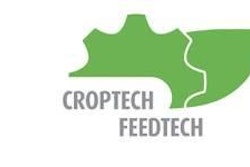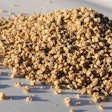More restrictions on antibiotic use in food animals are inevitable, and the search for alternatives has to take into account the integrity of both the upper and lower intestinal tracts. A shift in the understanding of where in the intestinal tract nutrients become available to the bird is important in devising an effective new antimicrobial strategy, said Dr. Stephen R. Collett of the Poultry Diagnostic and Research Center at the University of Georgia, as part of his presentation on organic acids, held during the second day of the Antibiotic Conference – Current Issues for the Poultry & Egg Industry at the 2013 International Production & Processing Expo.
The composition of the microbiota in the lower intestine determines the bird’s long-term performance, and an unfavorable environment in the lower gut will influence the upper gut, which has more effect on short-term performance. Management options include accelerating the evolution of the intestinal microbiota, rehabilitating it after a disturbance using the “seed, feed and weed” process, and immune modulation.
Competitive exclusion has been used in the poultry industry for several decades to control pathogens but is not an alternative to antibiotics, according to Dr. Dik Mevius of the University of Utrecht, The Netherlands. However, competitive exclusion may support gut health in the absence of antibiotics. It appears to support the control of enteropathogens and resistant organisms, but there is no evidence that it results in control of bacterial infections. “The solution is not in a bottle," said Mevius. "We need a holistic, systematic approach” to controlling the health of animals without systematic use of antibiotics.
The only viable alternative to anticoccidial drugs is the coccidiosis vaccine. Vaccination is antibiotic and drug-free, has no residues, is nontoxic, and uniformly controls all the significant species of coccidia in broilers, said Dr. Greg Mathis, president of Southern Poultry Research. Mathis has performed a study of vaccines, showing that they work as well as drugs. The comparative effectiveness varies, however, depending on which agents are used and how the evaluation was structured.
“Every bird and poultry house in the world has coccidia," said Mathis. "Coccidiosis is a very costly disease." Mathis estimated that worldwide prevention efforts cost more than $3 billion a year. When prevention is ineffective, the result is not only performance losses and mortality but changes in the bacterial profile, which can set off a chain reaction of other problems.
An integrated approach is best when formulating diets for antibiotic-free birds. Growers need to involve all aspects of production: feed, litter, light, air, water, space, sanitation and security. “If you pay attention to all of these, you can succeed with an antibiotic-free program,” said Dr. Marc de Beer, regional head of animal health and nutrition for DSM Nutritional Products America.
Making changes in the feed could be challenging, though, and achieving the right balance of energy and amino acids and protein is harder without antibiotics in the mix. Growers should choose high quality raw materials, including highly digestible animal byproducts, as products with a high level of indigestible materials can cause problems with viscosity and bacterial growth.
The U.S. Food and Drug Administration is moving forward with its plan to limit use of medically important antimicrobial drugs to those considered necessary for assuring animal health and include more veterinary involvement and consultation. Drug use is a driver of resistance, and judicious use can help curb the emergence of resistance through more targeted application, according to Dr. William T. Flynn, the FDA’s deputy director for science policy, Center for Veterinary Medicine, during his presentation on the FDA’s Perspective on the Future of Antibiotic Usage. The agency hopes to implement a series of changes within the next few years after receiving comments on several documents and holding meetings with producers and others who would be affected by the new guidelines.
Such changes are partly responsible for the growing interest in alternatives to intensive antibiotic use in the poultry industry. While the distinction between medically important drugs and others, which would not be subject to tighter regulation, may have wide support, challenges are ahead. One is the regulatory process for these approaches, said Ron Phillips, vice president of legislative and public affairs, Animal Health Institute, who provided an industry perspective on the future of antibiotic usage. “Is it sustainable to continue developing and marketing alternatives without some sort of independent examination of these alternatives?” said Phillips. He suggested that development of appropriate alternatives could be encouraged by more flexibility from government regulators.






